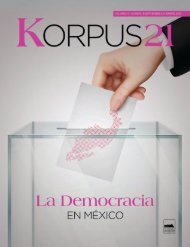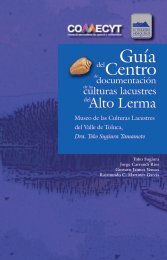Korpus 21 - Vol. 3
Korpus 21 - Nuevas interpretaciones acerca de la consumación de la Independencia.
Korpus 21 - Nuevas interpretaciones acerca de la consumación de la Independencia.
You also want an ePaper? Increase the reach of your titles
YUMPU automatically turns print PDFs into web optimized ePapers that Google loves.
KORPUS <strong>21</strong>, VOL. I, NÚM. 3, 20<strong>21</strong>, 395-418<br />
From this perspective Cortés’s deeds (and<br />
Alamán’s own policies when in government)<br />
did not appear so heinous compared to other<br />
historical cases in his own time in which he<br />
felt the ends justified the means. Alamán’s<br />
vindication of Cortés was not crudely hagiographical,<br />
nor did his commentaries on<br />
the sad state of Mexican post-independence<br />
politics mention the country by name. The<br />
implicit link here was his own embattled status<br />
as defending the implantation of Spanish<br />
institutions at swords-point, the imperatives<br />
of political stability, and the long view<br />
of historical possibilities. This was a position<br />
largely in keeping with the thinking of the<br />
Irishman Burke (1729-1797, on whom more<br />
below), a thinker Alamán invoked at many<br />
points in his writings.<br />
In writing in the Disertaciones of the implantation<br />
of Spanish royal authority in the<br />
newly conquered New Spain, Alamán drew<br />
an explicit comparison between the sort<br />
of governmental arrangements Cortés was<br />
able to establish within a short time, and<br />
the chaotic politics of his own day. That the<br />
comparison seems far-fetched and decontextualized<br />
is less important than what it<br />
says about the author’s thinking:<br />
The present offers us the contrast [with Cortés’s<br />
time] of all the ills produced by the instability<br />
of government, the ambition to gain<br />
control of it by the most disastrous means,<br />
and the unbridled passions of those situated<br />
in it. It demonstrates as well that it is not the<br />
difference in political forms that makes for<br />
the prosperity of nations […] But unfortunately<br />
political institutions have yet to arrive, nor<br />
is it probable that they will ever arrive, at a<br />
degree of perfection such that they obligate<br />
men who govern to work well within the limitation<br />
of faculties imposed on them, [so that]<br />
everything will always depend upon the personal<br />
qualities of individuals. The happy election<br />
of these [individuals] is a blessing that Divine<br />
Providence reserves in its deep secrets to<br />
bestow it on peoples when it desires to have<br />
them enjoy that degree of happiness that it<br />
is possible to possess on earth […] (Alamán,<br />
1942, 1: 200-201).<br />
In this passage Alamán is not only identifying<br />
Divine Providence as a mover in<br />
human affairs, something he was to do repeatedly<br />
in the HdeM. By this he meant the<br />
contingent in history, those aleatory events<br />
and processes that govern human life in general,<br />
behind which a divine intelligence might<br />
be doing its inscrutable will, a force in<br />
earthly affairs more akin to Fortuna. He is<br />
also ascribing good or bad government less<br />
to the nature of political institutions than to<br />
the men who hold power within them, and<br />
in a somewhat indirect way invoking the<br />
Machiavellian notion of virtú–the personal<br />
qualities required in a leader over and above<br />
those necessary in a good citizen (qualities<br />
that he felt Antonio López de Santa<br />
Anna to lack).<br />
Finally, Alamán was foreshadowing his<br />
later argument that national prosperity was<br />
not necessarily linked to the prevailing form<br />
of government e.g., to monarchical or republican<br />
systems as such as long as the men<br />
in power were disinterested, knowledgeable,<br />
and virtuous. He did come to feel that a<br />
monarchy offered the best chances for such<br />
government because of the political stability<br />
it might bring, but that in the Mexico of<br />
his time stability must mean economic development.<br />
This was a situational conviction<br />
of his rather than a lifelong one, although it<br />
certainly reflected his inclination toward a<br />
strongly centralized state. He wrote of the<br />
ideal government being antecedent to economic<br />
development as:<br />
[…] vigorous and energetic, [which] demonstrates<br />
that for nations to be happy it is necessary<br />
that authority be obeyed and respected,<br />
and that the unity of public power be able to<br />
repress anarchy, the necessary result of [political]<br />
division, whose unavoidable result is<br />
weakness and ruin (Alamán, 1942, 3: 37).<br />
Lucas Alamán’s youthful travels, study,<br />
and early political activities in Europe (1814-<br />
23) had convinced him that the British constitutional<br />
monarchy provided these elements,<br />
a far cry from the restored European<br />
absolutist regimes of the post-Napoleonic<br />
403


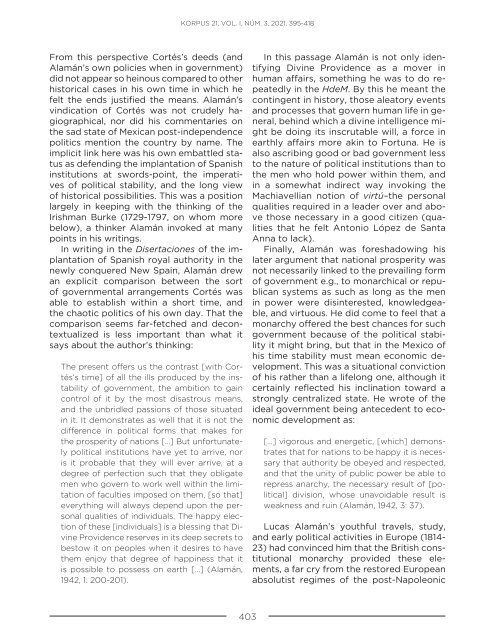
![bicentenario_1[V2]](https://img.yumpu.com/68677971/1/167x260/bicentenario-1v2.jpg?quality=85)
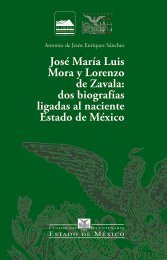
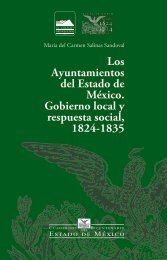
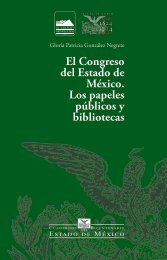
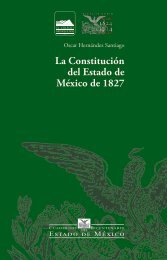
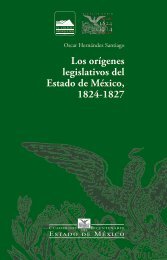
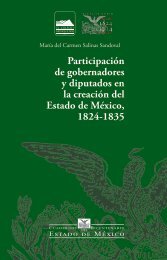
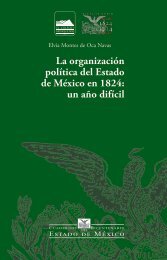
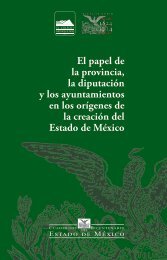
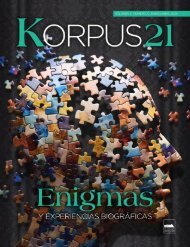
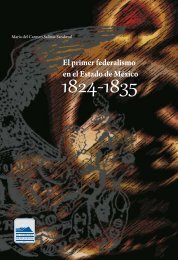
![El_primer_federalismoEM[final]_compressed (2)](https://img.yumpu.com/68483279/1/178x260/el-primer-federalismoemfinal-compressed-2.jpg?quality=85)
